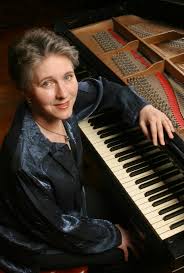 Pianist Janina Fialkowska.
Pianist Janina Fialkowska. When Janina Fialkowska returns to Jones Hall on Thursday to perform with the Houston Symphony, she’ll walk to center stage, sit down at the piano and play Frédéric Chopin’s Piano Concerto No. 2 – with both hands.
That may sound like an odd thing to say. But anyone who heard her last Houston Symphony appearance, in 2002, will recall that on that occasion she played with one hand only. The piece was Maurice Ravel’s Piano Concerto for the Left Hand, but Fialkowska played it with the only good hand she had – her right.
However, Fialkowska was determined to continue any way she could.
“You do desperate things when you’re in a desperate situation,” the soft-spoken 61-year-old Canadian pianist said.
She first noticed something wrong with her left shoulder late in 2001. And when a biopsy revealed a stage-three cancerous tumor, she underwent surgery, even though it meant removing some of her muscle tissue.
“The amazing thing,” she recalls, “is that I wasn’t worried about dying from cancer. I was worried that I might never play the piano again.”
As soon she had recovered from her operation, she turned her attention to the small clutch of piano pieces written for one hand only. Much of this music – such as the Ravel concerto and also a concerto by Sergei Prokofiev – was composed for the pianist Paul Wittgenstein, who had lost his right arm in World War I. It’s written specifically for the left hand, but Fialkowska worked out ways to play this repertoire with her right hand.
“I played 12 or 13 concerts this way during the two years when I couldn’t play with both my hands,” she says.
Canadian pianist Janina Fialkowska will be a featured soloist with the Houston Symphony this week.
But her one-handed performances were only a stopgap measure. Determined to return to two-handed form, she put herself on a regimen of piano practice.
“I would go to the piano and practice every day,” she says. “And the sheer act of playing the piano was therapeutic. That’s something the doctors hadn’t figured on.”
However, Fialkowska was careful as to how she went about it.
“At first it was just for an hour. But now I can play for up to 3½ hours a day, without a problem.”
Once she felt ready to return to two-handed performances, she soon encountered another obstacle: finding a concert manager to book her engagements. Fialkowska was damaged goods, and it was by no means certain that her return to an active performing schedule would be a success. Managers gave her a wide berth.
That’s when Fialkowska’s husband, Harry Oesterle, stepped up. Oesterle ran a music festival in Germany, but he set aside his own work to manage his wife’s comeback.
“Harry never wanted to be my manager,” she explains, “but it just kind of worked out that way. He always says that there’s nothing worse than a spouse managing a musician’s career – except perhaps a parent!”
Several more surgeries followed the removal of her tumor. But after years of struggle, her long ordeal eventually came to an end: Fialkowska has been cancer-free for six years now.
So how did the experience change her as a pianist?
“I’m a different pianist now,” she says thoughtfully. “And I like to think that I’m better. In the old days, I could learn things very quickly, and could cram nine hours of practicing into a day, if I had to. Now, I take much more time over my repertoire, and I have to plan literally years in advance. It’s only logical that this should benefit my playing, it’s just that I never did it before.”
She continues: “I also focus more on my left hand. You’d think it would be my weaker arm, but because I have to concentrate on it more, it’s made my lower notes more interesting. Before, I was very much a right-handed pianist.”
Since she’s returned to her two-handed career, Fialkowska has built a schedule of 35 to 60 concerts per year. And she’s returned to recording, with a new disc of piano music by Franz Schubert scheduled for release this fall, on Montreal’s Atma label. As well, she plans to record about two dozen of Chopin’s mazurkas next month.
When not playing the piano, Fialkowska gardens, hikes and reads mystery novels. She’s also writing a memoir, which she hopes will be completed by next November. In it, she reflects on her life in music – including her illness and her ongoing struggle to recover from it.
“My left arm is perfectly fine for playing the piano,” she observes, “but it can’t do much else. I can’t reach up or reach out with it. It’s completely handicapped, except for playing the piano – which I find highly amusing.”
© Colin Eatock 2013
 RSS Feed
RSS Feed

